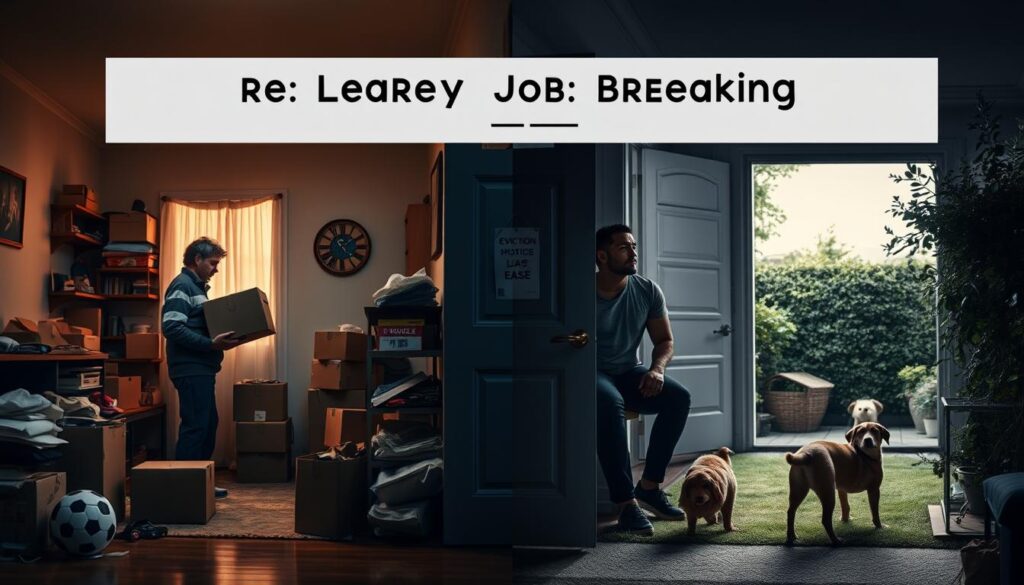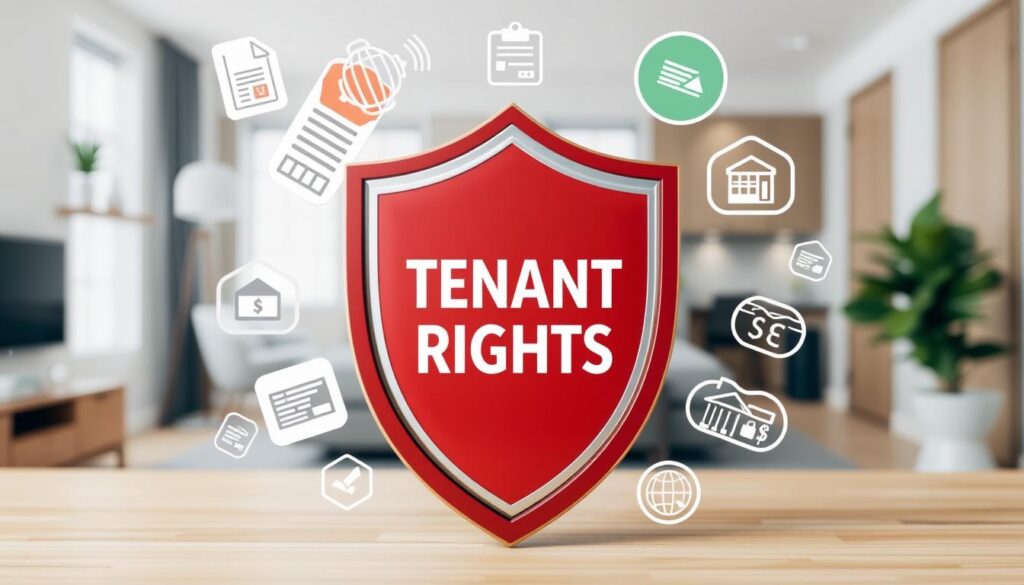Renting a home involves a legal contract called a lease. Sometimes, life changes force tenants to end this agreement early. Many wonder, “Will breaking my lease hurt my credit?”
This article explores how ending a rental contract early might affect your credit score. We’ll provide insights to help you handle this tricky situation.
Key Takeaways
- Breaking a lease can negatively impact your credit score, especially if you have outstanding rent or fees owed to the landlord.
- Understand your contractual obligations and the legal consequences of terminating a lease early.
- Learn how landlords report lease violations and unpaid rent to credit bureaus, which can damage your credit history.
- Explore ways to minimize the credit impact, such as negotiating with your landlord or paying outstanding balances promptly.
- Be aware of the potential implications on your future rental prospects and credit-based applications.
Understanding Rental Agreements and Credit Implications
Rental agreements outline duties for tenants and landlords. Breaking these terms can affect your credit report. It’s crucial to know the legal consequences of contract violations.
Contractual Obligations and Legal Consequences
Signing a rental agreement means promising to pay rent on time. It also means taking good care of the property. Breaking these promises can lead to lease violations.
Credit bureaus may receive reports about these violations. This info can show up on your rental history credit report. It might make getting future housing or loans harder.
Credit Reporting and Tenant Screening
Landlords often report unpaid rent to credit agencies. This can hurt your credit score. Future landlords may use this info during tenant screening.
A poor can breaking a lease affect your credit history can make finding new housing tough. Landlords might see you as a risky tenant to rent to.
Knowing how breaking a lease affects tenant rights credit is important. Following your rental agreement helps maintain good credit. It also protects your financial health.
Reasons for Breaking a Lease
Breaking a lease is a big decision. Job relocation and personal changes are common reasons. Let’s explore these scenarios and their potential impacts.
Job Relocation and Life Changes
Moving for work might require ending a lease early. Unexpected events like family illness or relationship changes can also prompt this decision.
In these cases, consider the breaking lease credit impact. It’s important to understand how it might affect your lease termination credit rating.
Safety Concerns and Property Conditions
Tenants have tenant rights credit regarding safety and livability. If a property becomes unsafe or uninhabitable, early termination may be legal.
This situation often comes with fewer penalties. It’s crucial to know your rights in such circumstances.
| Reason for Breaking Lease | Potential Impact on Credit |
|---|---|
| Job Relocation | Moderate, depending on communication with landlord and payment of outstanding balances |
| Life Changes (e.g., family illness, relationship changes) | Moderate, depending on communication with landlord and payment of outstanding balances |
| Safety Concerns and Property Conditions | Low, if tenant exercises their legal rights and follows proper procedures |
Knowing why you might break a lease helps you make smart choices. You can take steps to lessen any negative effects.
Always communicate with your landlord and understand your rights. This approach can protect your credit and financial future.

Can Breaking a Lease Affect Your Credit
Breaking a lease can hurt your credit score. You’re legally bound to follow the rental agreement terms. If you end the lease early or don’t pay rent, your landlord might report it to credit bureaus.
This can damage your credit for up to seven years. It may affect your ability to rent, get loans, or find jobs. Eviction credit score consequences are particularly harsh.
An eviction record can further harm your credit history. It can make finding a new rental property much harder.
| Scenario | Credit Impact |
|---|---|
| Unpaid rent due to early lease termination | Negative mark on credit report, potential collection activity |
| Missed rent payments prior to eviction | Negative impact on credit score, eviction record on credit report |
| Lease termination fees left unpaid | Additional negative items on credit report, potential collections |
To reduce can breaking a lease affect your credit impacts, talk openly with your landlord. Try to negotiate payment plans and fulfill your contract obligations.
Consider seeking legal advice or mediation. These can help you end a lease without harming your credit.
“Breaking a lease can have long-lasting effects on your credit, making it essential to explore all options and seek professional guidance before taking such a step.”
Handling Unpaid Rent and Lease Termination Fees
Breaking a lease may lead to unpaid rent and termination fees. These can harm your credit if landlords report outstanding balances. Open communication with your landlord is key to finding a solution.
Communicating with Your Landlord
Be proactive if you can’t meet rental obligations. Reach out to your landlord and explain your situation honestly. Offer to work together to find a resolution.
Unpaid rent credit damage can be reduced through clear communication. A cooperative approach with your landlord can help mitigate potential issues.
Negotiating Payment Plans
Landlords may agree to a payment plan for landlord debt collection credit. This can prevent immediate credit reporting and allow gradual repayment. Propose a realistic timeline and payment schedule.
Your security deposit might be applied to the owed amount. This can lessen the security deposit credit impact. Discuss deposit recovery with your landlord to offset the financial burden.
| Unpaid Rent | Termination Fees | Security Deposit |
|---|---|---|
| Potential credit damage from landlord reporting | Contractual obligations outlined in the lease agreement | Opportunity to apply deposit towards owed amount |
| Communicate with landlord to negotiate payment plan | Discuss with landlord to understand and potentially reduce fees | Work with landlord to recover deposit, if eligible |

“Open communication and a cooperative approach with your landlord can go a long way in mitigating the financial and credit-related consequences of breaking a lease.”
Eviction and Credit Damage
Breaking a lease can lead to eviction, damaging your credit score and rental history. Understanding the eviction process is crucial to protect your creditworthiness.
Understanding the Eviction Process
Eviction starts when a landlord serves a notice for non-payment or lease violation. If unresolved, the landlord may file an eviction lawsuit.
A formal eviction judgment can appear on your credit report. This affects your eviction credit score consequences and future housing options.
An eviction can stay on your rental history credit report for up to seven years. This makes it hard to rent another property.
“An eviction on your record can make it much harder to rent a new home or apartment in the future. Landlords often view an eviction as a red flag and may be hesitant to rent to you.”
To minimize impact, talk openly with your landlord. Try to negotiate a payment plan if possible.
Explore legal options if the eviction seems unfair. Quick action can help protect your credit score.
Mitigating Credit Impact After Breaking a Lease
Breaking a lease can hurt your credit score. This makes it hard to get future housing or good loan terms. But you can take steps to lessen the impact and fix your credit.
Prompt Payment of Outstanding Balances
Pay any outstanding balances quickly. This includes unpaid rent, fees, or damages. Paying on time shows responsibility and can reduce the negative impact on your credit report.
Credit Repair Strategies
After clearing balances, try these credit repair strategies. They can help improve your credit score after breaking a lease:
- Request a goodwill adjustment from the landlord to have the negative entry removed from your credit report.
- Dispute any inaccurate or incomplete information on your credit report with the credit bureaus.
- Establish a positive payment history by consistently making on-time payments on all your other financial obligations.
- Consider seeking the help of a credit repair service to guide you through the process and maximize your chances of credit score improvement.

Rebuilding credit after breaking a lease takes time and effort. Use the right strategies to regain your financial footing. Stay proactive and talk to your landlord.
Be persistent in your journey to repair your credit rating. With dedication, you can improve your credit score and financial health.
Rental History and Future Implications
Breaking a lease can hurt your rental history. Landlords often check this during tenant screening. Lease violations may make it harder to find housing later.
Tenant Screening and Credit Reports
Landlords typically run background checks when you apply for a rental. They review your rental history credit report. This report may show lease violations or lease terminations.
A good rental history shows you’re reliable and trustworthy. Landlords prefer tenants who honor their lease agreements. Your track record matters when applying for new rentals.
| Rental History Factor | Impact on Future Rental Applications |
|---|---|
| Broken Lease Agreements | Increased risk of being denied by potential landlords |
| Unpaid Rent or Lease Termination Fees | May be reported to credit bureaus, negatively affecting your rental history credit report |
| Evictions | Significantly reduce your chances of securing future rental housing |
Your rental history affects your future housing options. Take steps to keep a positive record. This will boost your chances of renting successfully in the future.
Protecting Your Credit While Breaking a Lease
Breaking a lease requires careful steps to protect your credit. Clear communication with your landlord is essential. A proactive approach can minimize credit impact and safeguard your finances.
Written Documentation and Communication
Thorough documentation is your best defense against credit-related disputes. Keep a paper trail of all landlord interactions. This includes formal notices, correspondence, and payment records.
Detailed documentation of the property’s condition upon move-out is also crucial. These records demonstrate your compliance with the lease agreement. They’re vital if credit reporting issues arise later.
- Formal written notice of your intent to terminate the lease, citing the applicable reasons
- Copies of any correspondence regarding the lease termination, such as emails or letters
- Records of any payments made, including rent, fees, or penalties
- Detailed documentation of the condition of the property upon move-out
Proactive communication with your landlord is key. Have open discussions to address their concerns or questions. This approach can help reach a mutually agreeable solution.

Proper documentation and communication are crucial when breaking a lease. These steps can protect your credit and financial well-being. Stay proactive and responsible to navigate this situation confidently.
Tenant Rights and Legal Recourse
Tenants have rights and legal protections when breaking a lease. Understanding your tenant rights is vital to protect your credit and finances.
You can end a lease early in certain situations, like safety issues or major property problems. If your landlord ignores serious issues, you may break the lease without penalty.
Landlords must follow proper eviction procedures. If they don’t, you can take legal action to prevent credit damage.
In some cases, you might recover damages from your landlord. This could include reimbursement for fees related to breaking the lease.
Knowing your tenant rights can be the difference between a credit score that’s damaged and one that remains intact.
Document all issues and communicate with your landlord in writing. This evidence can be crucial for legal recourse.
Being proactive about your rights helps navigate lease-breaking complexities. It can minimize the impact on your credit and future rental options.
Avoiding Lease Violations and Credit Damage
Protecting your credit as a tenant starts with preventing lease violations. This section covers strategies for maintaining good landlord relationships and practicing responsible tenancy.
These approaches can help you avoid prematurely ending your rental agreement. By following them, you’ll reduce the risk of damaging your credit score.
Responsible Tenant Practices
To minimize credit damage from lease violations, consider these practices:
- Thoroughly review and understand the terms of your rental agreement before signing.
- Make rent payments on time every month to avoid missed or late fees that could negatively impact your credit.
- Maintain the property in good condition and promptly report any necessary repairs to your landlord.
- Communicate openly and respectfully with your landlord about any issues that arise.
- Provide proper notice if you need to vacate the property before the lease term ends.
Maintaining a Positive Landlord Relationship
Building a positive relationship with your landlord can prevent can breaking a lease affect your credit situations. Here are strategies for a good landlord-tenant dynamic:
- Be responsive to your landlord’s communication and address any concerns promptly.
- Respect the property and adhere to the terms of your lease violation credit agreement.
- Avoid engaging in behavior that could be considered a tenant rights credit violation.
- Provide advance notice if you need to break the lease due to unforeseen circumstances.
- Collaborate with your landlord to find a mutually agreeable solution, if possible.
Responsible tenant practices reduce the risk of credit damage from breaking a lease. A positive landlord relationship is key to avoiding these situations.
By following these guidelines, you’ll protect your credit score and maintain a good rental history.
“The key to avoiding credit damage when breaking a lease is to prevent the need to do so in the first place. Responsible tenant behavior and a positive landlord relationship are essential.”
Conclusion
Breaking a lease can seriously harm your credit score and creditworthiness. Understanding the legal issues and credit reporting processes helps you make smart choices. You can use strategies to lessen the impact when ending a rental agreement early.
Not paying rent or lease fees can damage your credit report. This can hurt your can breaking a lease affect your credit score and future housing options. The eviction credit score consequences can worsen the breaking lease credit impact on your history.
Talk to your landlord and try to negotiate. Pay any outstanding balances to minimize long-term effects on your credit. This helps maintain a good rental history.
Know your rights and explore legal options when needed. This can protect your finances while dealing with lease termination issues.

